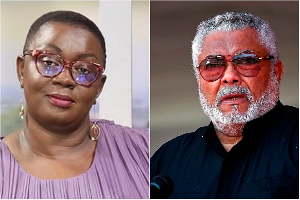The Diaspora Vote Committee is working hard to ensure that Ghanaians abroad get to vote in the upcoming general election in 2008. The group is leaving no stone unturned to present a convincing argument in Parliament if need be. The following are but a few of some points it plans to argue:
10) The Mythical Brain Drain. While other myopic perspectives would consider our migration as constituting ?brain drain?, the truth is that only our bodies left the country. Our brains are only a phone call or an email away. With today?s technology, there is no such thing as brain drain. The irony is that most of us who readily avail our brains to our brothers and sisters at home almost always hear the same phrase: ?Those ideas will not work here.?
Rather, our migration has ended up constituting ?brain gain.? The average Ghanaian immigrant gains additional knowledge when he or she has settled abroad. Of course that is not saying that those who stayed behind do not grow their brains. The fact is many of us pick up one or more degrees than what we had at the time of migrating. Again the newly acquired skills are readily available for Ghana if our folks would take advantage of them.
9) Democracy?s Students. It is hard to imagine why any country would seek to adopt an effectively new and unfamiliar concept such as democratic governance, and consciously alienated her sons and daughters most of whom live the concept everyday. It is like learning to eat with cutlery in rural Ghana but refusing to include a family member who just returned from England in the process.
Democracy is one of those concepts that do not receive justice from books. You can learn it, or read about it to grasp the idea. But unless you have actually seen it in practice on a day to day basis, you are going to miss a thing or two about it. A typical example of misunderstanding democracy is our penchant, for example, to mistake freedom of speech for freedom to insult. During the last presidential election in United States, the Democrats used words like ?mislead,? ?misdirect,? and so on. Never did any worthwhile Democrat call President Bush a ?liar,? even though it was obvious that he might have. In Ghana today, some go as far as calling our president a liar with virtually no basis.
8) Ghana a Political Pioneer? Even today, many Africans associate Ghana with political pioneerism. Among other things, being the first country south of the Sahara to obtain independence, with our own Dr. Kwame Nkrumah championing African Unity at a time when other leaders barely knew their own borders, and with our own Kofi Annan as the first Black African to head the United Nations, it is clear that we set the tone in many political areas.
Had we acted quickly on this voting issue, we would have continued that trend. Today, African countries like South Africa, Senegal, and a couple more allow their citizens in the Diaspora to vote in elections at home. That means we are beginning to follow rather than lead politically in Africa.
7) Nothing to lose but everything to gain. The Diaspora Vote Committee (DVC) conducted a poll last August. In that poll, 20% of respondents thought a fair processing fee to vote in Ghana would be $50.00. Those who thought $20.00 would be fair accounted for 65% of the respondents. Then 10% thought $10.00 would be fair while some 5% thought it must be free.
Supposing the Electoral Commission pegged the processing fee at $25.00 and one-third of the estimated 3 million Ghanaians abroad elected to vote, that will bring in roughly $25 million, which is about 75% of Electoral Commission?s budget for four years. The government could then channel that savings to other areas.
6) Are Ghanaians at home more patriotic? A few may mention it, and most would not, but the primary factor driving the sentiments opposing Dual Citizenship and the Diaspora Vote is patriotism. Ghanaians abroad are deemed unpatriotic because they left when the going got tough. Those who stayed are deemed to be more patriotic because in spite of the hardship, they stayed and shepherded the country through hard times.
Give credit where it is due. I speak for many Ghanaians abroad when I say that our folks at home made up proud. Hearing all the conflicts in Rwanda, Liberia, Sudan, Congo, or just about every African country, Ghanaians abroad are especially proud that our brothers and sisters always settled their differences amicably. But I am yet to see one Ghanaian who had the opportunity to travel abroad during the really tough time, but who chose to stay at home for patriotic reasons. Some may have had the opportunity but elected to stay, but it was not for patriotic reasons.
5) ?It?s the economy stupid.? When Chinese people fled their country due to communist rule, they were not even allowed back. The philosophical differences between democracy and communism and between capitalism and socialism were so stark during the cold war that Chinese, especially those living in the United States, were cut off from even communicating with their relatives at home lest they taint their minds about the benefits of democracy and capitalism. Meanwhile China wallowed in economic despair.
When the Soviet Union fell, and China was left naked, although it maintained the communist form of government, it began to open its market up and expose it a bit to capitalism. Even Chinese abroad were relied upon to aid the home front. Some worked with the government to pilfer intelligence from the U.S. Some were allowed to bring home their wealth. The result has been nothing short of a spectacular turnaround. China is the economic power it is today because of her citizens abroad. Conversely, in spite of the massive political gains made by Ghana, her economy continues to struggle because of the continued alienation of her citizens abroad.
4) A mother is irreplaceable. Ghanaians at home are especially hostile to Ghanaians who pick up other citizenship. The easy argument is that if you cared about Ghana, you would have remained a Ghanaian. Why should anyone drop a Ghanaian citizenship, and then turn around to insist on voting in Ghana?s elections?
For those asking these questions, simple education would suffice in holding their horses. For starters, one of the most difficult decisions Ghanaians ever make abroad is the adopting of a new citizenship. But it is a decision many have had to make to further their opportunities ? the same opportunities that result in increased remittances back home. When those opportunities are no longer viable we can drop the newly acquired citizenship in a heartbeat. To simplify the argument, I liken it to marriage. I can marry Sandra today, divorce her and marry Mary tomorrow if that marriage is not going well. But when my relation with my mother is not going well, I cannot change mothers. Ghana is mother to all of us.
3) We are able to vote our conscience. Credit for this reason goes to Kwaku Azar of Gainsville, Florida. Whether it is true or not, some candidates are rumored to buy votes in Ghana. What makes this practice effective is that many, unfortunately uneducated Ghanaians, place a higher priority on the cedi that is given to him or her today than the value of a vote. Who could blame them? If I were in their position, I would probably trade my vote for a few hundred thousand cedis to feed my family especially when a vote for candidate A or candidate B would bring me no immediate benefit.
Ghanaians abroad are fortunate to be in positions where that would not be a problem. No bad candidate can pay me enough to vote for him, or no chief can compel me to vote for a bad candidate, and that holds true to just about every Ghanaian abroad. That means our votes would go only to the candidates who have met our individual requirements.
2) It is the right thing to do. If Ghanaian population abroad was likened to a region, it would be the second largest behind Ashanti. Estimates have us at 3 million. Ashanti has 3.3 million while Greater Accra has 2.9 million. With the entire Ghanaian population at 22 million, that makes Ghanaians abroad 12% of the population. In comparison, China?s estimated 80 million citizens abroad only make up 5.71% of her 1.4 billion population. India?s estimated diaspora population is 9%, and Nigeria?s is 4.38%.
In addition to size, our financial contribution is immense. According to President Kufuor, Ghanaians abroad are the third leading foreign exchange earner for the nation.? And this is money coming in for which we surrender no permanent resources as we do when we sell gold and cocoa abroad. Those who may say Ghana is indeed surrendering human resources are obviously not paying attention to the unemployment figures.
1) IT IS THE LAW OF THE LAND. The Constitution of the Republic of Ghana, Chapter 7 Verse 42 states: ?Every citizen of Ghana of eighteen years of age or above and of sound mind has the right to vote and is entitled to be registered as a voter for the purposes of public elections and referenda.?















